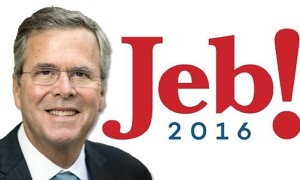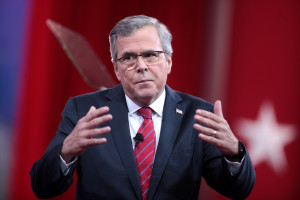
I’m going to start this post with the controversial thing, before moving on to the analytical thing.
Now, I know you. You’re going to want to angrily write to me about the controversial thing, and especially how I’m wrong. I don’t care. What I’m hoping is that we can turn quickly to the analytical thing, which is far more important to discuss.
Controversial thing
Jeb Bush is going to be the Republican nominee for President. I mean to say, Jeb!
I know, I know, he’s nowhere in the polls, lackluster in the debates and the exclamation point on his campaign logo can really only be understood ironically. Doesn’t matter.
I write as a “recovering banker” because I think a financial framework is a useful starting point for viewing the world. Jeb! is the only one in the Republican race with $100 million backing him. He will win. I expect all of you who write in an angry note about my controversial statement will also agree to mail me a dollar in Summer 2016 when I turn out to be correct. Ok? Thanks.
Analytical thing
Having said that, I want to talk about the future Republican nominee’s tax policies. Tax policy matters tremendously. Jeb!’s got a 50-50 shot at the White House (I just mean any D versus any R is a coin flip in any quadrennial) We should know what he stands for.
Tax code overhaul
In the second paragraph of his policy statement on taxes, Jeb! calls for a complete overhaul of the US tax code.
He’s troubled by the ‘thousands of special-interest giveaways, subsidies and other breaks” for Washington insiders.
He correctly points out – as have others before him – that the complexity of an 80,000-page tax code leads to unfairness, cronyism, and the need for a virtual standing army of tax lawyers and accountants. Jeb! cites a study that found the cost of complying with the US tax code reached $168 billion per year in 2010 for individuals and corporations. Which is crazy, and infuriating.
All of which is to say, I love where Jeb! is going on simplifying the tax code.

Lower Taxes
Jeb! proposes reducing the number of income tax rates to three, at 10, 25 and 28 percent respectively. Most controversially, the highest tax rate would drop from the current 39.6 to 28 percent. I don’t make a million dollars per year, but if I did, that drop would save me a cool $100,000 in taxes right there, which sounds pretty, pretty sweet.
I don’t have a calculator powerful enough to tell me whether lowering and simplifying income tax rates will leave us closer or further from balancing the federal budget – which remains an important fiscal goal – but I expect some finance nerd in the campaign to fire up their spreadsheets to examine that one. Hopefully before enacting legislation.
Mortgage Interest Deduction
Jeb! would cap that at 2 percent of Adjusted Gross Income (AGI). Yay! While I benefit personally from it, I kind of hate the mortgage interest tax deduction.
Corporate Taxes
The current top corporate rate is 35 percent.
Jeb! would “lower our corporate tax rate to 20 percent – below China’s – to bring jobs and manufacturing back to the United States.”
Ok, stop. I have to call foul on that one. Maybe the lower corporate rates are cool, I don’t know. But that’s going to bring manufacturing back to the United States? From China? No. Labor-intensive manufacturing (the kind that creates those new jobs) is not coming back that way. I’m sorry, but it’s gone. Perhaps if you lowered labor costs in the US to – I don’t know – $2 dollars an hour?
World-wide Taxation
Jeb! proposes eliminating US taxation of corporate income earned overseas. This issue comes up periodically when we read about Apple, for example, holding a $181 billion cash hoard or Microsoft amassing a $93 Billion cash pile overseas (for an estimated $2 Trillion cash-pile overseas among all US corporations) to avoid paying relatively high US tax rates on foreign earnings.
In my deep-dive into this issue (yes, ten minutes = deep dive), I’ve learned that the US is one of only six developed countries that maintains this tax on foreign earnings, down from twenty-five countries, thirty years ago.
A wave of corporate reverse mergers is currently under way in which companies like US-based Pfizer sell themselves to companies like Ireland-based Allergen in order to avoid this tax on foreign earnings.
You can choose to blame greedy companies for acting in their shareholders’ interest. Or you can choose to blame tax policy. Not that other countries are always right, but most of them have eliminated this tax and I can imagine the complicated and inefficient incentives this taxation causes. On balance I’m willing to give Jeb! the benefit of the doubt on this issue about which I’ve just now read a few articles.
This proposal by Jeb! seems reasonable to me, but I could be wrong. You can sort of see why some US multinational corporations might find a Jeb! presidency particularly to their advantage. Not that there’s anything wrong with that.
Estate/Death Tax
Jeb! would eliminate this entirely. Boo! The estate tax is the best of all taxes.
I’ve already written about that and gotten plenty of hate mail on the issue (so feel free to restrain yourselves) but the estate tax is progressive, democratic (with a small D), and distorts consumption far less than other taxes.

Carried Interest Tax
I saw nothing on the campaign website about carried interest tax policy – a favorite pet topic of mine – but I remain interested to learn Jeb!’s views.
Still skeptical that Jeb! will capture this nomination? Just remember, nobody actually liked Mitt Romney either as the Republican nominee in 2012. So, you know, follow the money.
A version of this post ran in the San Antonio Express News.
Next week: The Clinton campaign’s tax proposals.
See related posts:
Hillary Clinton 2016 Campaign Tax Policy
Interview on Mitt Romney and the Death of The American Dream
Adult Conversation about Income Tax Policy
Post read (462) times.
